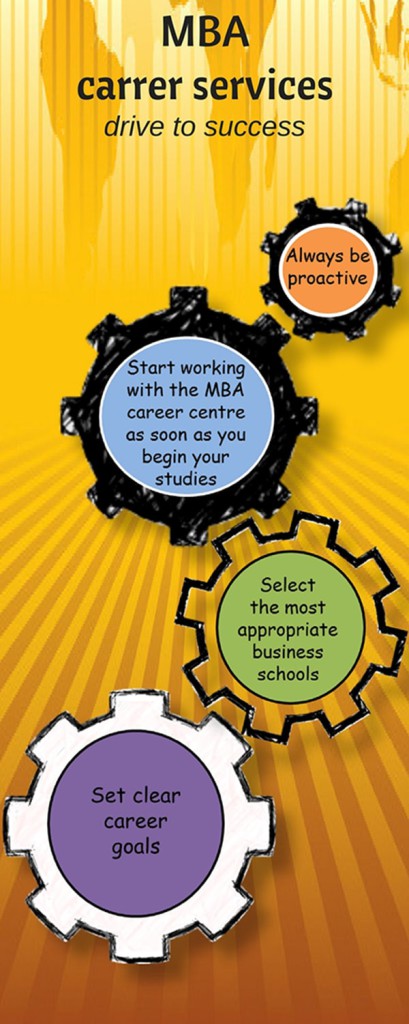
Why business school care about MBA careers
There are two major reasons for the growth of MBA career services. The first is that business schools now realise that the career success of their alumni is a major selling point in MBA programmes. Ultimately, the return on investment (ROI) and the return in happiness (RIH) determine the value of the overall MBA experience in the short and long-term. Along these lines, the recession of 2008 – 2009 also encouraged business schools to improve their career services. MBA recruitment was hit by difficult times in the corporate world. So business schools compensated by helping their students land attractive jobs despite the crisis.
The second factor boosting the growth of MBA career services is the MBA’s increased cachet beyond the corporate world. Traditionally, the MBA was a highly valued qualification to climb the corporate career ladder in the Western world. Nowadays, it is valued worldwide in almost any sector and industry. Entrepreneurship and the start-up industry additionally turned out to be fertile soil for the growth of MBA talent. This diversity of career paths and industries has led to MBA career services expanding beyond traditional corporate recruitment.
Check out: MBA Career Services Make the Difference
How to evaluate MBA career services
The MBA is always about change. Contemplating an MBA means that you want to make a career change – move to a new company, take a managerial role, work at an international level, make a career in new country or region, apply your skills in a new industry, or start your own company. You should approach your MBA application with a specific career goal or at least up to three scenarios for your post-MBA path. Your career goal is essential in selecting the right MBA programmes.
Check out: Career Goals and the MBA Application (Video)
When selecting business schools always inquire about the scope of MBA career services and evaluate them against your needs. It’s vital to consider the sectors and industries in which the career centre specialises. Some centres have dedicated consultants per industry. SDA Bocconi School of Management (Italy) aims to help students fully understand the industry sectors they are most interested in and evaluate their options based on their profile and aspirations. MBA participants at Oxford Said Business School (UK) benefit from insights and pragmatic advice of a select group of
sector consultants who have experience of working for leading firms across a broad range of sectors across a range of industries including management consulting, finance, high-tech, new ventures, media and communications, and diversified industry in general.
The scope of the services varies greatly. The MBA Career Development Programme at INSEAD (France) spans the whole process – “Know Yourself. Know the Market. Strategise and Execute”. The programmes takes MBA students through 5 stages of developing a career plan – self-assessment, career vision, career design, job search, job application, and salary negotiations. B-schools often provide personal and leadership coaching as part of their MBA career development programmes.
From job placement to career strategy
Career services have also shifted strategy greatly. Immediate post-MBA jobs are still an important selling point for MBA programmes, but they now look to long-term career success. This is also because current and future professionals are likely to change jobs much more frequently than they did 20 years ago. New professions crop up every day, requiring lifelong learning and acquiring transferable skills, as well as a vision of how to navigate your career.
ESADE Business School (Spain) is among the leading business schools aiming to help MBA participants “develop the lifelong skills for successfully managing their careers”.
IMD Business School (Switzerland) has developed an MBA career methodology focused on “Building Your Future” that takes MBA participants through two stages:
During the first part of the programme, a unique career audit methodology provides a clear-cut view on individual skill profiles and gaps and the potential for capturing value from transferable skills. The second half of the programme allows you to individualise your curriculum in view of personal post-MBA ambitions.
Significantly, IMD involves its career experts in the MBA admissions process. This helps the admissions committee evaluate the relevance of applicants’ career goals against the resources of the business school to ensure post-MBA career growth.
Who is the driver of career success?
Business schools have developed comprehensive career services but it is essentially MBA participants themselves who should propel their own success. To achieve in the long-run, you should take time and effort to set clear career goals before applying for an MBA. Based on these you should select the most appropriate business schools considering all that they can offer – curriculum, network, learning environment, business exposure, and career services, among others. Finally, start working with the MBA career centre as soon as you begin your studies and always be proactive. Business schools care more and more about your success, but ultimately your career and lifestyle are your own responsibility.




Comments